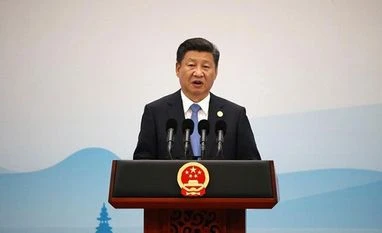As President-elect Donald Trump said on Mond that America will quit the Trans-Pacific Partnership (TPP) on his first day in office, China which is opposed to the trade deal, began pushing for the proposed FTAAP calling it critical to long-term prosperity of the region.
Chinese President Xi Jinping in an address to APEC CEO Summit in Peru yesterday made a strong case for Free Trade Area of the Asia-Pacific (FTAAP) saying that it is a "strategic initiative critical for the long-term prosperity of the Asia-Pacific".
Hours later Trump formally announced his decision to nullify the 12-nation TPP - the world's largest trade deal - pushed by outgoing President Barack Obama to bolster American leadership in Asia.
Xi asked the countries in the region to "firmly pursue the FTAAP as an institutional mechanism for ensuring an open economy in the Asia-Pacific," state-run Xinhua news agency reported.
Also a commentary by Xinhua said Xi's call has been well received throughout the region, and action is now required to accelerate the process that was launched at the 2014 APEC summit in Beijing.
The significance and urgency of the FTAAP have increased amid the threat of rising protectionism in the region, and the WTO expectation that growth of global trade will slow for the fifth year in 2016, it said.
If established, the FTAAP will be one of the largest free trade agreements (FTA) in the world, covering 57 per cent of the global economy and nearly half of the trade.
An open and inclusive FTA gathering such a wide range of economies would invigorate regional and global trade, Xinhua said.
The FTAAP would reduce the fragmentation caused by separate, non-inclusive FTAs. By the end of 2015, 160 FTAs had been signed between APEC members, including over 60 regional FTAs, it said.
Observers say the end of Obama's term and advent of a Trump administration appears to benefit China at least initially, as besides scrapping TPP, Trump was also expected to go slow on the 'pivot to Asia' under which US will deploy 60 per cent of naval assets in the region to contain Beijing.
China is also happy that the scrapping of TPP will hit rival Japan hard as it is the second biggest country to push the trade deal to isolate China.
Japanese Prime Minister Shinzo Abe has already said TPP is as good as dead without the US.
"US disengagement, if that is what the demise of TPP and the threat to withdraw from NAFTA (North American Free Trade Agreement) entails, could see the return of spheres of influence, which is the approach that Russia and China have championed," Marc Chandler, global head of currency strategy with Brown Brothers Harriman told South China Morning Post.
With the demise of TPP, China looks to push for Regional Comprehensive Economic Partnership (RCEP) and FTAAP.
"And these moves on trade leadership come within the context of China's "One Belt One Road", a multi-year, multi-billion-dollar blueprint to expand China's investment, trade and strategic influence throughout Asia; alongside Beijing's funding of new development lending institutions like the Asian Infrastructure Investment Bank," a BBC commentary said.
Chinese President Xi Jinping in an address to APEC CEO Summit in Peru yesterday made a strong case for Free Trade Area of the Asia-Pacific (FTAAP) saying that it is a "strategic initiative critical for the long-term prosperity of the Asia-Pacific".
Hours later Trump formally announced his decision to nullify the 12-nation TPP - the world's largest trade deal - pushed by outgoing President Barack Obama to bolster American leadership in Asia.
Also Read
Also a commentary by Xinhua said Xi's call has been well received throughout the region, and action is now required to accelerate the process that was launched at the 2014 APEC summit in Beijing.
The significance and urgency of the FTAAP have increased amid the threat of rising protectionism in the region, and the WTO expectation that growth of global trade will slow for the fifth year in 2016, it said.
If established, the FTAAP will be one of the largest free trade agreements (FTA) in the world, covering 57 per cent of the global economy and nearly half of the trade.
An open and inclusive FTA gathering such a wide range of economies would invigorate regional and global trade, Xinhua said.
The FTAAP would reduce the fragmentation caused by separate, non-inclusive FTAs. By the end of 2015, 160 FTAs had been signed between APEC members, including over 60 regional FTAs, it said.
Observers say the end of Obama's term and advent of a Trump administration appears to benefit China at least initially, as besides scrapping TPP, Trump was also expected to go slow on the 'pivot to Asia' under which US will deploy 60 per cent of naval assets in the region to contain Beijing.
China is also happy that the scrapping of TPP will hit rival Japan hard as it is the second biggest country to push the trade deal to isolate China.
Japanese Prime Minister Shinzo Abe has already said TPP is as good as dead without the US.
"US disengagement, if that is what the demise of TPP and the threat to withdraw from NAFTA (North American Free Trade Agreement) entails, could see the return of spheres of influence, which is the approach that Russia and China have championed," Marc Chandler, global head of currency strategy with Brown Brothers Harriman told South China Morning Post.
With the demise of TPP, China looks to push for Regional Comprehensive Economic Partnership (RCEP) and FTAAP.
"And these moves on trade leadership come within the context of China's "One Belt One Road", a multi-year, multi-billion-dollar blueprint to expand China's investment, trade and strategic influence throughout Asia; alongside Beijing's funding of new development lending institutions like the Asian Infrastructure Investment Bank," a BBC commentary said.
)